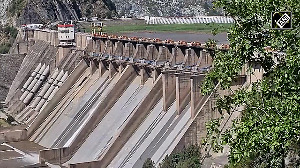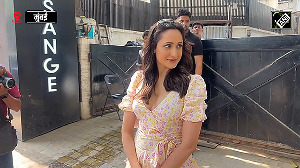The bottomline of telecom companies is about to receive a mega boost following an order in the MTNL versus income tax authorities battle.
The Income Tax Tribunal has held that the liability by way of license fee, being statutory in nature, is allowable deduction in the year to which it was relatable.
As the amount of licence fee amounting to Rs 234.70 crore (Rs 2.347 billion) was relatable to the year under consideration, the income tax authority was directed to allow the same.
The disallowance upheld by the CIT(A) was, therefore, deleted.
The ITAT held that in case of a contractual/commercial/civil liability, the deduction was allowable when the liability has been raised. In other words the contractual liability accrues on day the demand is raised. But in the case of statutory liability the same was allowable deduction in the year to which such liability was relatable.
MTNL had challenged the order of the CIT(A) in upholding the disallowance of the claim of Rs 234.70 crore made by the assessee in respect of License Fee paid by it to Department of Telecom (DoT), Government of India.
The appellant was a public sector corporation incorporated on 28.2.86 for providing the services of telecommunication. With effect from April 1, 1986 it took over the management, control and operation of Delhi and Mumbai Telecom districts with all the assets & liabilities.
The government of India (DoT) vide its letter No. 1-101/85-MTAC/PHB dated 27.03.86 granted license to the Appellant Corporation to establish, maintain and work telephone services for Metros of Delhi, Mumbai, Navi Mumbai and Thane Telephone districts.
License was initially granted for a period of five years effect from April 1, 1986. MTNL purchased fixed assets (land apparatus & plant, lines and wires, cables motor vehicles building) for Rs 900 crore (Rs 9 billion) vide sale between President of India and MTNL on April 1, 1986. The sole consideration was discharged by way of allotment of shares of Rs 599,94,84,000 to the President of India for consideration other than cash.
The balance sales consideration was treated as unsecured loan to MTNL @ 14% As per agreement between MTNL and DOT, charges payable for the use of National Network are fixed at a percentage of gross income booked for the year.
National network charges is part of operational expenses while levy was for rural development.
The assessee debited a sum of Rs 234.70 crore to its profit and loss account and in the return of income/computation of income the deduction of the same was claimed. However, at the time of assessment the assessing officer noted that the claim of deduction under this head has gone up to Rs 234.70 crore in the year under consideration as compared to the claim of Rs 198.68 crore (Rs 1.986 billion) of last year.
The assessing officer, therefore, asked the assessee to justify the claim of deduction. The appellant made the submissions before the assessing officer vide letters dated August 17,1999 and December 15, 1999.
In nutshell the appellant stated that licence fee paid by the MTNL (appellant) was incidental to the running of its business; it was charged against the profits and not an appropriation of the profits; license fee assumed character of royalty and, therefore, the same was allowable deduction under section 37(1) of the Act.
The appellant also claimed that license fee stood diverted by the overriding title and, therefore, it was allowable deduction. The appellant also claimed that even as per provisions of section 35 ABB of the Act the license fee was the allowable deduction.
However, the submission of the appellant did not find favour the assessing officer who disallowed the claim of the appellant. While doing so the assessing officer observed that MTNL was paying DoT, rural levy from assessment year 1988-89 up to assessment year 1992-93.
The payment of Rural levy was discontinued by DoT's order dated December 13, 1993. Enhanced license fees of Rs 800 per working Direct Exchange Line was paid to DoT on the strength of D.O. Letter No. 26-10/94-7A I dated 08.06.94.
This was further enhanced to Rs.900 per WDEL from F.Y. 1995-96. DOT enhanced the license fee on the strength of an office memorandum without assigning any reason whatsoever as a result of which 5.82% of the gross revenue was paid to the Department of Telecommunication, while 21.88% of the gross revenue was paid as National Network Charges (NNWC) for use of DoT's network.
While National Network Charges were paid for the use of the DoT's Network, License fee in contrast could not be relatable to any item of service of DoT.
AO held that the assessee contention that the expenditure was allowable, deduction under section 37(1) of the Act was not tenable.
While relying on the Supreme Court's decision in the case of Malyalam Plantations reported in 53 ITR 140 the assessing officer held that the purpose of enhanced license fee was to divert the assessee's fund to DoT and reduce the appellants taxable income.
Further reliance was placed on the decision in the case of Travoncore sugar and Chemical Ltd reported in 88 ITR 1 (SC). The assessing officer also held that on the payment of license fee the appellant obtained rights over the jurisdictional area as also the assets in the jurisdictional area and simultaneous transfer of assets.
If the appellant had got new right by paying such royalty then the payment by what ever name called could be capital in nature as the appellant could get an advantage of enduring nature. He also held that the appellant could also not be entitled to any depreciation as no tangible assets have come into existence.
The assessing officer also held that even the payment could not be entitled to deduction under section 35 ABB of the Act, This section was introduced by the finance Act 1997 from April 1, 1996 which deals with the tax treatment to be given in respect of expenses for obtaining the license to operate telecom services.
The section provides tax treatment to be given in respect of payment, which has actually been made to obtain a license. In the appellant case the MTNL came into being paid @ Rs 101 per annum.
As such the subsequent exorbitant increase in the license fee from 94-95 onwards cannot be treated as amount paid to obtain the license.
Revenue stated that the reliance on the ITAT decision in the case of VSNL was not justified. While referring to paragraph 20 of the ITAT order in the case of VSNL the learned CIT(DR) stated that in this paragraph the Tribunal has not given any finding to the effect that the liability by way of license fee was a statutory liability.
He stated that the liability of license fee was not statutory liability as charging license fee was not a sovereign function of the State. The reliance was placed on the decision reported in (1994) 6-SCC 205. The liability to the appellant has arisen due to agreement and, therefore, the liability was commercial/contractual.
He stated that such contractual liability has arisen on the date the DoT has informed the appellant about its liability towards the license fee. As the O.M. was issued by the DoT on a date, which fell in the subsequent year, the liability of license fee cannot be allowed as deduction in the year under consideration.
He further stated that moreover in the case of VSNL it was using the infrastructure of the DoT but the appellant was not using the infrastructure of DoT. In nutshell he supported the order of the CIT(A).
The Tribunal observed that appellant corporation was incorporated in February 1986. The Government of India by virtue of powers conferred under section 4 of the Indian Telegraph Act vide its O.M. dated 27.3.86 transferred the management control and operation of the telecommunications in Delhi, Mumbai, Navi Mumbai and Thane districts to the appellant corporation alongwith all the assets and liabilities of the said telephone districts.
Section (4) of Indian Telegraph Act 1985 provides that the Central Government shall have the exclusive privilege of establishing maintaining and working telegraphs in India. However, proviso to Section 4 provides that the central government may grant a license on such conditions and in consideration of such payments as it thinks fit to any person to establish, maintain or work telegraph within any part of India.
The appellant was, therefore, delegated the powers to establish, maintain the telegraph within the specified areas on the payments of certain charges. In addition to some other charges the appellant was required to pay the license fee also which was originally fixed at Rs 101 only for the period relevant to the AY 86-87 to 93-94. Subsequently such license fee was increased by the government from time to time.
The Government of India (DoT) vide its communication dated 19.4.96 extended the period of license to appellant for one year commencing from 1.4.96 on the earlier terms and conditions except the license fee which was to be intimated subsequently. Vide letter-dated 25.5.97, the DOT had intimated the appellant its liability towards the license fee pertaining to the financial year 96-97 which was claimed as deduction by the appellant.
The assessing officer /CIT(A) disallowed the same on the ground that the expenditure was not revenue expenditure. Various reasoning were advanced by the A.O./CIT(A) for the purpose. In the AY 95-96 and 96-97 also the assessing officer /CIT(A) disallowed the similar claim of deduction of license fee paid by the appellant to the DoT.
The assessee had taken up the issue before the Tribunal. Before the Tribunal the appellant corporation had inter alia placed reliance on the decision of the Mumbai Bench of the Tribunal in the case of VSNL.
After considering the submissions of both the sides the Tribunal in paragraph 31 of its order dated 10.12.01 in I.T.A No. 1088 and 1068/Del/00 has held as under:
"We agree to the aforesaid view and finding of the ITAT Bombay Bench in the case of VSNL. Since the claim of the license fee and share of revenue to DoT in the present case is the same as that in the case of VSNL, following the said decision of the ITAT we would hold that payment of license fee and share of revenue to the DoT was allowable as revenue expenditure for the business as an overriding charge on the income of the assessee company"
See full text of Judgement in 2004-TIOL-53-ITAT-DEL in Legal Corner.






 © 2025
© 2025